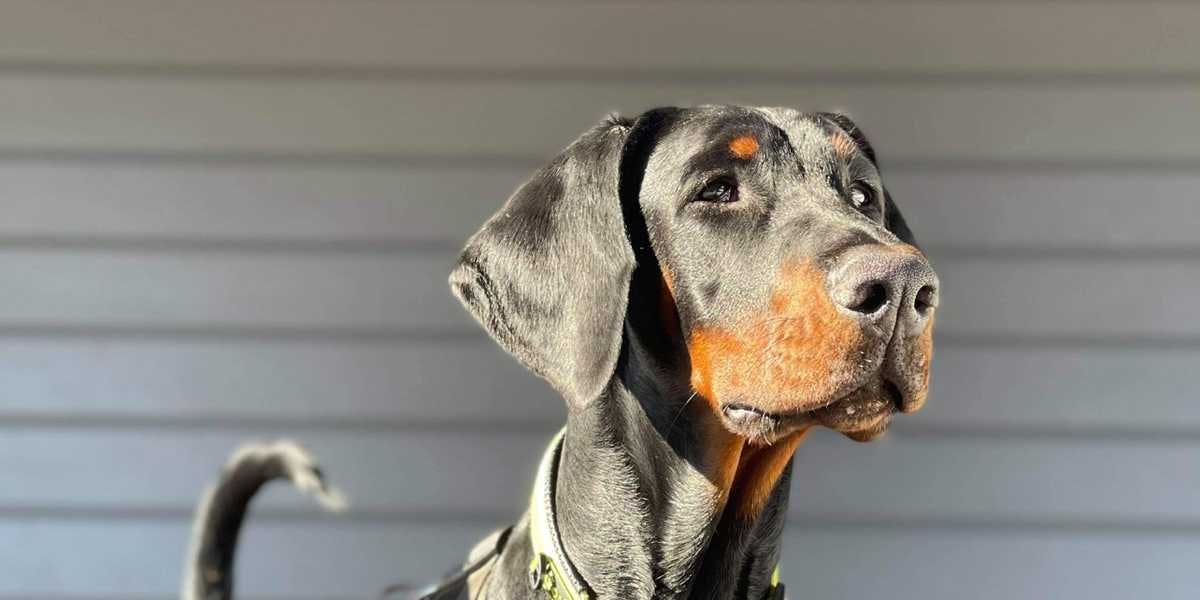DOGBREEDS
Doberman Pinscher is a commonly misunderstood breed that ties strong bonds to its family
The Dobermann Pincher were originally bred for protection and guard duty, and they remain a popular choice for police and military work to this day. However, they also make excellent family pets for owners who are willing to put in the time and effort to properly train and socialize them.
The Doberman Pinscher was named after a tax collector and dog catcher
The breed was first bred in 1860s Germany. It is believed the Dobermann was a mix of both Thuringian Shepherd, Weimaraner, and Beucherons.
Today's Dobermann contains elements from several other breeds, including the greyhound and Manchester terrier.
The name Dobermann comes from the German tax collector and dog catcher Louis Dobermann. He wanted a dog that could act as a protector, which the Dobermann was perfect for. The breed previously went by the name Dobermann Pinscher.
Doberman is the 5th most intelligent dog breed
The Dobermann has been popular as a rescue dog and as a police dog.
A much misunderstood and misrepresented breed
Doberman Pinschers, also known as Dobies, have a reputation for being aggressive and dangerous dogs. However, this breed is often misunderstood due to their appearance, history, and popular media portrayal.
One of the reasons why Dobies are misunderstood is because of their physical appearance. They have a muscular and athletic build, which can make them look intimidating to people who are not familiar with the breed. In addition, their commonly cropped ears and docked tails contribute to their intimidating appearance, but these procedures are purely cosmetic and have no practical purpose.
Another factor that contributes to the misunderstanding of Dobies is their history. The breed was originally developed in Germany in the late 19th century by Karl Friedrich Louis Dobermann, who wanted a dog that could protect him while he worked as a tax collector. As a result, Dobies were bred to be protective and loyal to their owners, which can be interpreted as aggression if not properly trained and socialized.
Lastly, popular media portrayal of Dobies as vicious and aggressive dogs also contributes to their misunderstanding. Movies and TV shows often depict Dobies as attack dogs, which can create fear and negative stereotypes about the breed.
In reality, Dobies can make excellent family pets if properly trained and socialized. They are intelligent, loyal, and eager to please their owners. They are also great protectors and can be trained to be therapy dogs and service dogs.
It is important to remember that any dog, regardless of breed, can be aggressive if not properly trained and socialized. Responsible ownership, including training, socialization, and exercise, can help ensure that a Dobie is a loving and well-behaved family pet.
In conclusion, Dobies are often misunderstood due to their physical appearance, history, and popular media portrayal. With proper training and socialization, Dobies can be excellent family pets and loyal companions.
Big, elegant, and friendly
The Doberman is both a great companion and working dog that display versatile features while radiating elegance.
People who contemplate getting this breed should know they require a constant upbringing. They need socialization from an early stage to get along with other dogs. Some Dobermann dogs tend to be dominant towards other dogs.
A Doberman Pinscher is friendly, brave, calm, and has high self-esteem. With the right owners, they have the potential to become unique hiking buddies and great family members. This presupposes that they get plenty of exercise and activation. A Doberman loves to spend time with his family and is not suitable for dog kennels.
Health
One of the most common health issues that affect Dobermans is hip dysplasia. This condition occurs when the hip joint doesn't develop properly, causing pain and discomfort in the dog. In severe cases, it can even lead to lameness. Owners can help prevent this condition by ensuring that their Doberman maintains a healthy weight, receives proper nutrition, and gets enough exercise.
Another significant health issue that affects Dobermans is dilated cardiomyopathy (DCM). This is a type of heart disease that affects the dog's ability to pump blood efficiently. While the exact cause of DCM is still unknown, it is more prevalent in Dobermans than in other breeds. Symptoms of DCM include weakness, fatigue, and shortness of breath. Regular visits to the veterinarian can help diagnose and manage this condition.
Dobermans are also prone to a condition called von Willebrand's disease, which is a bleeding disorder that can cause excessive bleeding during surgery or injury. This condition can be diagnosed through a simple blood test, and it is important for owners to inform their veterinarian if their Doberman has this condition before undergoing any surgical procedures.
Other common health issues that affect Dobermans include hypothyroidism, skin allergies, and bloat. Regular check-ups with the veterinarian and proper care can help prevent or manage these conditions.
To keep your Doberman healthy, it is important to maintain a regular schedule of check-ups with a trusted veterinarian. Proper nutrition, exercise, and preventative care can help keep your Doberman happy and healthy for many years to come. Owners should also be aware of any signs of illness, such as lethargy, loss of appetite, or changes in behavior, and seek veterinary care immediately if necessary.
Contact us
Contact us
Media & Partnerships
support@lildog.com
Address
Lildog AS - Skippergata 14
7042 Trondheim, Norway
